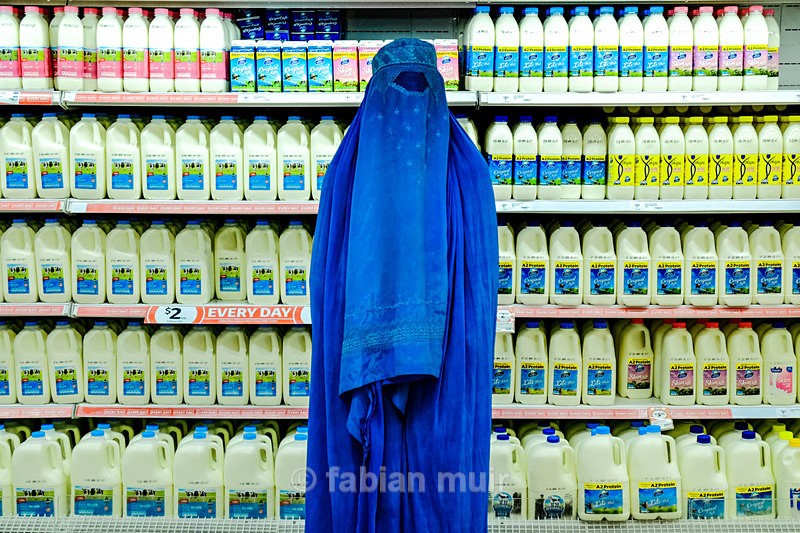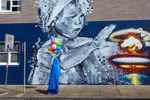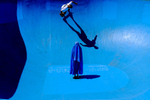
February 2017: ‘Urban Burqa’ is the sequel to the series ‘Blue Burqa in a Sunburnt Country’, which was shot in 2014 as a response to the Abbott government’s anti-immigration policies at that time and its proposal to impose a ‘burqa ban’. It was also a personal reflection drawn from extensive travels over time through predominantly Muslim countries.
While a few people in 2014 had a knee-jerk reaction to the very sight of a burqa and incorrectly assumed that the series favoured forcing women to wear one, it was simply an allegorical device referencing immigration, rising populism, empathy and assimilation. That series’ intention was to protest against blanket judgments based on beliefs, origin or appearance — ’Urban Burqa’ is no different in that regard.
Significantly different, however, are today’s parameters. Whereas ‘Blue Burqa’ addressed only Australian issues, the sequel finds itself confronted by drastically changed global conditions: a not-always-united Europe grappling with an unprecedented crisis as it tries to assimilate refugees; a surge in extreme right-wing movements in traditionally tolerant societies; an Australia where 49% of the population would like to put a halt to Muslim immigration; and President Trump, who seems to legislate by royal decree and has already attempted to impose a comprehensive travel ban upon selected Muslim nations with the stroke of his pen. Bringing the burqa in this series into sometimes confronting or disorienting urban environments seeks to reflect this and encourage greater understanding.
In particular, President Trump’s sordid attempt to thrust anti-Muslim sentiment onto the mainstream agenda under the guise of homeland security suggests a jingoistic, reckless desire to generate paranoia and provoke a so-called clash of civilisations based on nationality and belief. Some of the current news footage is already beginning to resemble the sort of dystopian vision that was previously the domain of novels.
These developments raise a great many questions. Why does the mere fact that someone was born in a certain country or hold dual citizenship automatically make them a suspected terrorist? While other major western governments oppose the ban and its contrived justification, why does the Australian government remain largely passive? How could any conscientious person criticise Angela Merkel’s exemplary and humanitarian approach to the refugee crisis as a ‘catastrophic mistake’? How can 49% of Australians be so devoid of empathy and understanding, vilifying refugees who leave their own homes to escape horrific circumstances — in some cases caused by western intervention — as if this were a criminal act? What has happened to the presumption of innocence, a fundament of any functioning justice system?
We are facing issues that go to the heart of our humanity and the very nature of western democracy. How thinking people and governments now respond will be crucial in defining who we really are. Despite everything, I remain optimistic and ‘Urban Burqa’ is intended as a small part of that response.
While a few people in 2014 had a knee-jerk reaction to the very sight of a burqa and incorrectly assumed that the series favoured forcing women to wear one, it was simply an allegorical device referencing immigration, rising populism, empathy and assimilation. That series’ intention was to protest against blanket judgments based on beliefs, origin or appearance — ’Urban Burqa’ is no different in that regard.
Significantly different, however, are today’s parameters. Whereas ‘Blue Burqa’ addressed only Australian issues, the sequel finds itself confronted by drastically changed global conditions: a not-always-united Europe grappling with an unprecedented crisis as it tries to assimilate refugees; a surge in extreme right-wing movements in traditionally tolerant societies; an Australia where 49% of the population would like to put a halt to Muslim immigration; and President Trump, who seems to legislate by royal decree and has already attempted to impose a comprehensive travel ban upon selected Muslim nations with the stroke of his pen. Bringing the burqa in this series into sometimes confronting or disorienting urban environments seeks to reflect this and encourage greater understanding.
In particular, President Trump’s sordid attempt to thrust anti-Muslim sentiment onto the mainstream agenda under the guise of homeland security suggests a jingoistic, reckless desire to generate paranoia and provoke a so-called clash of civilisations based on nationality and belief. Some of the current news footage is already beginning to resemble the sort of dystopian vision that was previously the domain of novels.
These developments raise a great many questions. Why does the mere fact that someone was born in a certain country or hold dual citizenship automatically make them a suspected terrorist? While other major western governments oppose the ban and its contrived justification, why does the Australian government remain largely passive? How could any conscientious person criticise Angela Merkel’s exemplary and humanitarian approach to the refugee crisis as a ‘catastrophic mistake’? How can 49% of Australians be so devoid of empathy and understanding, vilifying refugees who leave their own homes to escape horrific circumstances — in some cases caused by western intervention — as if this were a criminal act? What has happened to the presumption of innocence, a fundament of any functioning justice system?
We are facing issues that go to the heart of our humanity and the very nature of western democracy. How thinking people and governments now respond will be crucial in defining who we really are. Despite everything, I remain optimistic and ‘Urban Burqa’ is intended as a small part of that response.
|
Previous (10 of 10)

|

|








